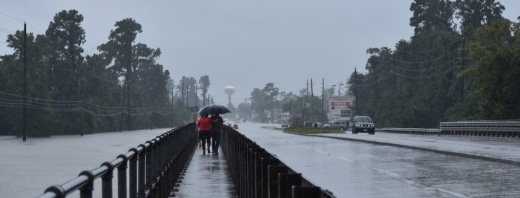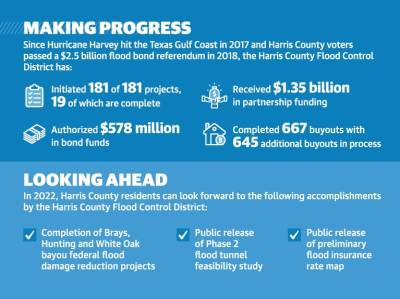“We had a 10-year plan, and the way things are mapping out, ... we should be done with pretty much everything by early 2029,” Zeve said. “But the vast majority of our spending is happening now.”
A majority of that spending will come from completing three federal flood damage reduction projects this year along Brays, Hunting and White Oak bayous—each of which costs more than $100 million, Zeve said.
In addition to those projects, HCFCD officials will submit preliminary flood plain maps in late January to the Federal Emergency Management Agency, which will issue the preliminary flood insurance rate map in the summer. Brian Edmondson, project manager for HCFCD’s Modeling, Assessment and Awareness Project, or MAAPnext, said the new rates could take effect in 2024. The nearly $30 million effort, which began in January 2019, will be the first time the entire county’s flood plain has been remapped since 2001.
In mid-December, HCFCD officials also completed the Phase 2 feasibility study of constructing an underground tunnel in Harris County to divert floodwaters, Zeve said. However, the results will not be released to the public until sometime in 2022.
“We briefed all of the members of Commissioners Court on the results of that study and we got a wide variety of reactions,” Zeve said. “Because of that, we’re not in a place where we can release the results of the tunnel study just yet.”
Future projects
Outside of the 2018 bond program, the HCFCD received $250 million from FEMA in December to fund sediment removal across eight watersheds over the next five years.
In 2021, HCFCD officials also completed 10 watershed planning studies, which identified new projects. While Zeve said some elected county officials have mentioned the possibility of a second flood bond program, that will depend upon how much more debt the county can take on.
“Even if we had $100 billion instead of $2.5 billion, we can only go so fast at a time,” Zeve said. “We would love to have all that money because then we’d know we can do what we need to do. But all of our projects take a certain amount of time.”
With or without another bond, Zeve said the HCFCD’s budget needs will continue to grow to pay off bond debt and maintain new infrastructure.
“Every time we build a new project, we have to take care of it, and every time we have to take care of it, that costs more money,” he said.
As of mid-December, the county administrator’s office was still searching for a new HCFCD executive director. Alan Black will continue to serve in this capacity in the interim.






